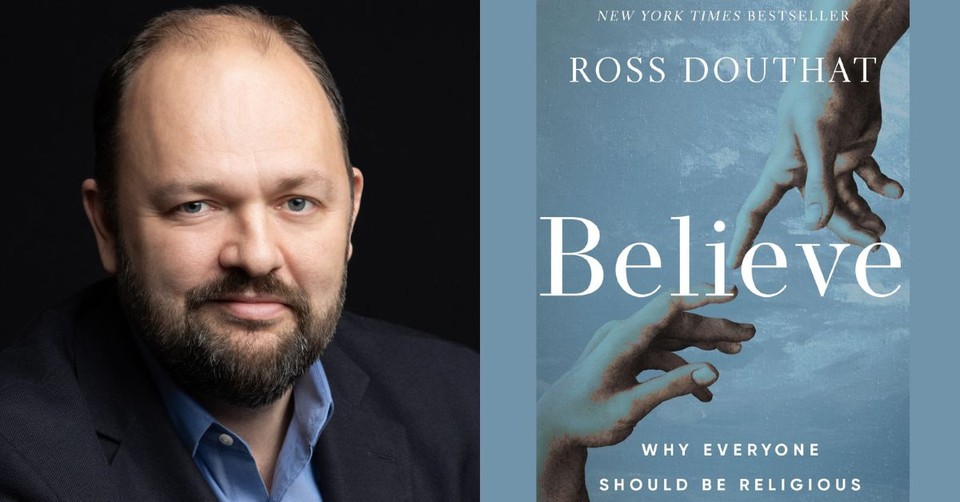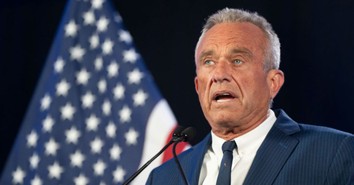New Atheism Age Has Passed and Religion Is Making a Comeback, Ross Douthat Says

In a secular age marked by religious illiteracy but also spiritual curiosity, author Ross Douthat is offering a new book for skeptics and seekers alike -- making the case that religious belief isn't just plausible, but essential and intellectually credible. Years ago in America, his new book -- Believe: Why Everyone Should Be Religious (Zondervan) -- would not have been necessary. Faith was often a given, even among those who rarely attended church. But that's no longer the case. Millions have walked away from churches over the past two decades, leaving a generation with little to no exposure to even basic religious traditions. At the same time, though, interest in spiritual questions is on the rise.
In Believe, Douthat -- a devout Catholic -- makes a case for faith to skeptics and secularists, devoting the bulk of his arguments not to Christianity specifically, but to religion more broadly. Only in the final chapter does the New York Times columnist turn directly to his own faith, explaining why he is a Christian.
"I'm trying to offer an introduction to religion itself, for people who are interested in faith and have no experience of it," Douthat told Crosswalk Headlines. "We're in a cultural moment where we've gone through this period of secularization. We have a lot of -- especially younger Americans, who have grown up not just without strong religion, but [also] without any connection to Christmas and Easter Christianity or a little Sunday School or anything like that.
"[But] you have a lot of religious interest right now -- to a greater degree than 10 or 15 years ago."
The New Atheism promoted by such authors as Sam Harris and Richard Dawkins, Douthat said, has failed to deliver what it promised.
"If you go back and read a lot of those writers, the clear promise is, 'If people just stop believing in the invisible sky daddy, then everyone will be more reasonable, more enlightened, happier, healthier, less repressed, less fearful of Hell' -- and America in the early 2020s just doesn't look like that.
"The more secular America is more socially isolated, unhappier, more politically polarized -- definitely not more reasonable and scientific and all those things."
At the same time, Douthat notes, interest in UFOs and New Age spirituality is on the rise -- concepts that hint at an interest in the supernatural and the unknown.
"Christians should recognize that there is an opportunity, that people have this impulse and this desire -- and that the mystical and supernatural is itself just a basic fact of human existence that doesn't go away," Douthat said. "People don't have to be religious to have mystical experiences.
"Christianity is itself supernaturalist, and has to take a certain kind of ownership of that in an environment where even atheists are interested in taking psychedelic drugs and meeting their spirit guide or whatever."
Religious belief has an intellectual advantage over non-belief, Douthat argues in the book. Often, though, it is the intellectual person who struggles the most to embrace the mystery of faith.
"I'm writing into that space and saying, 'Here are the fundamental reasons why I think there's actually an intellectual obligation to be religious, to take the idea of a higher power and an order in the universe and the supernatural seriously.'… And the book ends with Christianity, with my own Christianity, trying to explain where it fits. And so [the book] is, in a sense, a kind of Christian apologetics in disguise. I mean, I'm sort of open about it, right? But it is trying to walk people on a journey -- where the first door you enter isn't Christianity. The first door you enter is: Is there meaning and purpose and intentionality behind the universe? -- and why should we think that there is."
Photo Credit: ©Zondervan
Michael Foust has covered the intersection of faith and news for 20 years. His stories have appeared in Baptist Press, Christianity Today, The Christian Post, the Leaf-Chronicle, the Toronto Star and the Knoxville News-Sentinel.
Listen to Michael's Podcast! He is the host of Crosswalk Talk, a podcast where he talks with Christian movie stars, musicians, directors, and more. Hear how famous Christian figures keep their faith a priority in Hollywood and discover the best Christian movies, books, television, and other entertainment. You can find Crosswalk Talk on LifeAudio.com, or subscribe on Apple or Spotify so you never miss an interview that will be sure to encourage your faith.
Originally published May 13, 2025.







